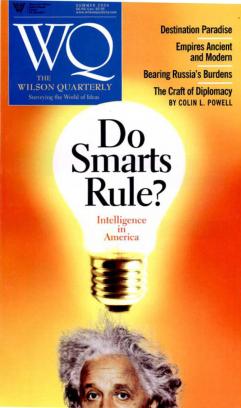Do Smarts Rule?


"Western civilization" has lost its cachet, leaving Americans and Europeans both groping for an identity.
Professionally run advocacy groups have largely taken the place of federations, unions, and farm groups. The result: some peoples' voices are not being heard.
One critic believes the key to civic involvement is to return to teaching civics in America's schools.
Too many states have tied taxes to boom-and-bust business cycles, instead of saving responsibly.
Anti-Americanism is much in vogue around the world, but no one seems to agree on why they hate the United States.
International tribunals, reconciliation commissions, truth commissions--all aim at coming to terms with genocide and human rights abuses. But do they prevent future abuses?
Many blame neoconservatives for the decision to launch the war in Iraq. Now that criticism comes from one of their own.
Karl von Clausewitz may be the most quoted military strategist ever. Perhaps that's because his contradictory writings can be used to justify almost any position.
The World Trade Organization was supposed to clear up the muddled mess of tariffs. It hasn't happened yet.
Can money buy happiness? Most polls seem to suggest so.
Ever wonder what happens to that stuff you return at the mall? You should. It adds up to a $55 billion annual loss for businesses.
Legendary management guru Peter Drucker offers a few pointers to aspiring business executives.
Liberals and conservatives haves switched sides in assessing the Supreme Court's landmark desegregation decision.
Political scientist Samuel P. Huntington touched off a firestorm with his disturbing essay about the Hispanic "challenge to America's traditional identity."
Critics of the No Child Left Behind Act decry its cost, but the authors of a new study say the effort's real price tag is only 5 to 10 percent of most projections.
Fireworks in the South seem to carry a much deeper message than just making a loud noise.
Did the media miss the facts about the war in Iraq? Not exactly...but many Americans did, if they were paying attention to the wrong news source.
Former New York Times executive editor Howell Raines's postmortum on the Jayson Blair affair may also be sounding the death knell of the paper itself.
Why do atheists get such a bad rap in America? Blame the Cold War.
The terrible toxin may be Africa's only hope against malaria.
Neuroscientists are proving some of Freud's theories about the inner workings of the human brain.
Fish farms may be the wave of the future.
Putting together a definitive poetry anthology was anything but a dream job for one stressed English professor.
Theater's origins may be obscure, but its appeal is universal.
On the eve of the centennial of Ayn Rand's birth, a scholar considers her legacy.
Ethnic tensions are straining the communal solidarity that is the foundation of Britain's progressive welfare state.
Mexico still struggles with many problems, but one observer argues that, on the whole, NAFTA has had positive effects.
Russia seems a mess, but two observers think most assessments are far too gloomy.
Two new biographies attempt to unwravel the mysteries of Georgia O'Keeffe's life.
Anti-Semitism has deep roots in Europe, but it seems to be spreading in disturbing new ways.
INSIDE THE VICTORIAN HOME: ...
STALIN:
The Court of the Red Tsar.
By Simon Sebag Montefiore. Knopf. 785 pp. $30
EMERGENCY SEX AND OTHER DESPERATE MEASURES: ...
MYSELF AND STRANGERS: ...
MERCE CUNNINGHAM: ...
DANTE IN LOVE: ...
DEGREES KELVIN: ...
OPENING SKINNER’S BOX: ...
SECRETS OF THE SOUL: ...
PREACHING EUGENICS: ...
Imagine a breezy, palm-fringed island in the Indian Ocean. There’s no money, no Internet or TV, and a single phone line to the outside world. Only a handful of people are allowed to visit each year. Tempted? The author was, and he tells what he found.
For centuries, Russia’s intelligentsia occupied a unique place in the life of its country, flickering like the light of a candle in the dark. Now that the worst of the darkness has been disspelled, will the light vanish too?
What two eloquent Frenchmen, Voltaire and Montesquieu, had to say in the 18th century about the forces that sustain or shatter great powers remains surprisingly relevant.
America seems consumed by a cult of intelligence.
Researchers cannot agree on what constitutes intelligence.
Higher education has turned into big business, perfecting their institutional brand.